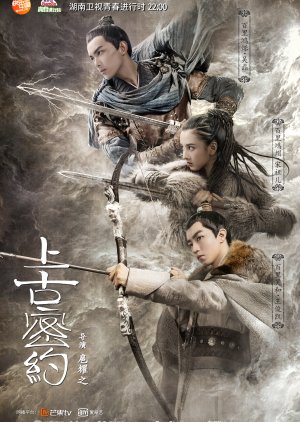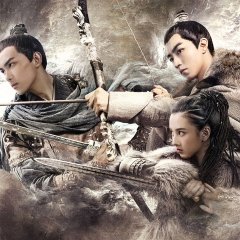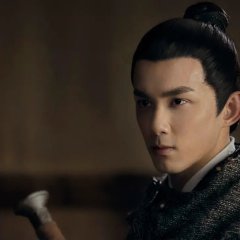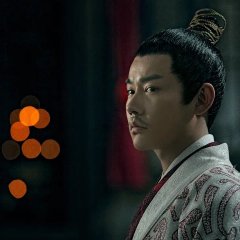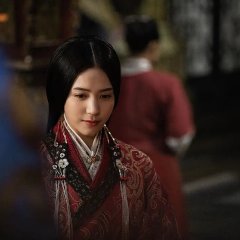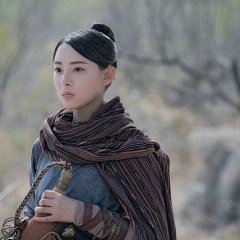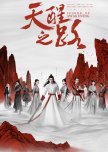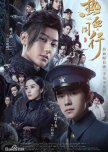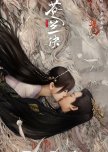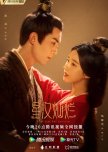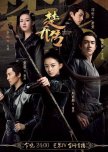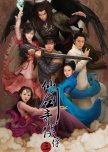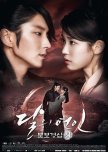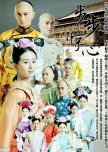 Rising Post-95 Chinese Actors to Look Out For
Rising Post-95 Chinese Actors to Look Out For Dans l'Antiquité, un monstre sauvage errait sur les terres des hommes, laissant dans son sillage un paysage de sang et de désolation. Incapable de stopper le monstre déchaîné détruisant tout sur son passage, le monde était au bord du chaos complet. Ce n'est qu'après que les Cinq Grands Éléments eurent accepté d'unir leurs forces qu'ils purent enfermer le démon. Cependant, Jiuying ne fut pas complètement enfermé et put errer dans le monde des hommes pendant un millénaire. Peu disposé à laisser sa vie sur Terre s'écouler tranquillement, Jiuying utilise tous les moyens à sa portée pour préparer son retour et se venger. Une tâche d'autant plus facile que l'instabilité politique secoue l'État de You. Établi par la famille Bai Li, au cours des dynasties Wei et Jin, le jeune roi You ne reculera devant rien pour garder sa place sur le trône. Ayant ordonné la décapitation du fils aîné, Bai Lu Hong Xuan, le deuxième fils, Bai Li Hong Shuo, est envoyé en exil, tandis que la fille adoptive de la famille, Bai Li Hong Yi, est rejetée par le peuple You et renvoyée devant le Khan de la tribu des loups, Ming Yefeng. Une fois les héritiers Baili écartés, le roi You est libre de régner en paix. C'est du moins ce qu'il pense. Consumés par la haine et animés par leur désir de vengeance, les frères et sœurs Bai Li se lancent à la quête de l'aide des dieux antiques pour reprendre ce qui leur revient de droit. Saisissant cette occasion en or, Jiuying se joint aux frères et sœurs Bai Li pour se réincarner en empereur de You. À présent en position de pouvoir, Jiuying commence sa propre quête pour libérer à nouveau le monstre légendaire. Une famille aussi poussée par la haine peut-elle trouver un moyen de laisser le passé derrière elle et d'arrêter Jiuying avant qu'il ne soit trop tard ou le monde retombera-t-il dans le chaos ? (Source: Viki) Modifier la traduction
- Français
- Italiano
- Deutsch
- English
- Titre original: 山海经之上古密约
- Aussi connu sous le nom de: The Classic of Mountains and Seas , Shan Hai Jing Zhi Shang Gu Mi Yue , Chinese Bestiary , The Classic of Mountains and Seas: The Promise Keepers , Gardiens du serment antique
- Réalisateur: Hu Yao Zhi
- Genres: Romance, Wuxia, Fantastique
Où regarder The Promise Keepers
Distribution et équipes
- Leo Wu Rôle principal
- Lareina Song Rôle principal
- Karry Wang Rôle Secondaire
- Fiction GuoHou Zheng ZeRôle Secondaire
- Zhang Ling XinLing JunRôle Secondaire
- Zheng KaiMing Ye FengRôle Secondaire
Critiques

I waited and waited and waited for it to get better. It never did.
As a fan of Nirvana in Fire, I perked up when I saw that Leo Wu and Zhang Lingxin were both in Guardians of the Ancient Oath, and gave it a go.First Impressions (1-4):
The first few episodes were actually very promising. The machinations of the Yo Imperial Court contrasted well with the serenity of the Baili household, and Ming Ye Feng promised to raise big waves in the Wolf Tribe.
The cinematography is great in general, and the dim and gritty colour palette is also to my taste, as it speaks to a sort of realism and a lack of anachronism on the director's part.
Mid Season (5-33) Impressions:
This is where it starts to fall apart. The quality of the screenplay falls off a cliff (esp. the dialogue) and the generic/cliche storyline can no longer support the agonising pacing.
It just feels like people talk a lot without getting to the main point, and repeat themselves in general. Lareina Song parrots this line like a broken record across an entire arc of the drama: "If you touch him, I'll kill you!".
Leo Wu, Lareina Song, Karry Wang, and a full 80% of the other characters just aren't interesting to watch - the viewer can already predict what they will do and its incredibly boring to watch this occur, without any tension.
Props to Ming Yefeng, Baili Hongxuan, An Tingfeng, and Ling Jun, the only multifaceted characters, for painfully dragging the comatose body of the storyline forward towards the final arc.
There is zero humour in this drama, just none. Yuen Wah's Ji Qiu tries his very best but there's no straight man to match his absurdity - what a waste of this talented actor.
The active CG (the magic) is good in general, blends well into the scene and isn't poorly made. The passive CG is quite poor - the backgrounds of many Wolf Tribe wilderness scenes have been green-screened very obviously.
And could they stop blasting the main theme at full volume at every available opportunity, multiple times an episode? Did they commission ANY OTHER music at all?! Why is there no instrumental-only version of the main theme?
Final Impressions (34-45):
Episodes 34 to 36 were quite good, as the main characters finally start coming into their powers. This change of events wasn't to last though, as somehow the drama became even more boring after these three episodes than the episodes that came before them.
There is a confusing and haphazard introduction of the "ancient" characters, and because of the insistence of masking their faces and using three different names to refer to the same characters, viewers have no idea who is talking to whom.
Each of the very strong, very important-ish "Wu" disciples barely have 10 minutes to recite their entire lifestory: it is not odd then that all these new characters actually make the drama more boring - they just become repetitive obstacles for the protagonists to overcome.
It's not all terrible though; throughout the drama, you could say that Lareina Song had portrayed three different characters: the present, the past, and the "ancient". With each iteration her character became more interesting, and her acting talent more clear (I thought it was extremely poor in her first iteration, but I guess that was how it was written).
Ling Jun is also very consistent as the prime mover of the plot, but somehow Ming Yefeng became a stereotype of his own role, and Baili Hongxuan deteriorated to become a ranting and raving lunatic of a racist.
There is also an uncomfortable undertone of genocide/racism and sexism in the ending arc.
If a character is not a human, they should die [for the plot].
If a character is a woman who doesn't adhere to the Three Obediences and Four Virtues, they should die [for the plot].
If a character is a woman who is not a human, it's impossible that they could adhere to Confucian values and so they should die [for the plot].
Conclusion:
The very best dramas have likable heroes with depth, likable villains with depth, and likable side characters with depth. I find almost every character in this drama unlikable and one dimensional as written.
The protagonists on paper, Baili Hongshuo, Baili Hongyi, and Baili Haohe do not have sufficient agency in the storyline to be proper protagonists (Baili Haohe was a puppet both figuratively and literally: I dare say Karry Wang's role is not a real main character and only has top billing because he's famous/popular). None of the three have any motivation beyond what's been narrowly defined, are not complex, nor deep.
The final villain, on the other hand, has no real reason to be evil except for "it's the character's nature to be evil". What drives them? Evil. What is their hobby? Evil. Why are they fighting the protagonists? Because of evil muahahaha! Somehow this made perfect sense to the writers of this drama.
The actual protagonist of the entire narrative is An Tingfeng, and his tragic epilogue is ordained by karma. His character, and Ling Jun's character, have the only well-thought arcs from start to finish of this drama.
TLDR: Watch something else unless you are an idol superfan.

But I have promises to keep, and miles to go before I sleep.
Patience is required for this drama that is unlikely to enjoy broad appeal. It is a Beijing Academy student production so don't expect high production values; indeed there is a distinctly amateurish and unpolished feel to the entire effort.The shadowy and suspenseful plot is steeped in the supernatural and mythology and takes a long time to unfold. The synopsis, which already gives away much of the story adds to the impression that nothing is happening. Hidden forces conspire to release the demon Jiu Ying, that according to legend was sealed by five deities representing the five elements (metal, earth, water, fire and wood). This manifests itself in increasing hostilities between the You Kingdom and the Wolf Tribe that make war and chaos seem inevitable. These events bring the three siblings Hongxuan, Hongyi and Hongshou whose Baili family has long been the power behind the You throne; together with Ming Yefeng, the leader of the Wolf Tribe who also has a mysterious past with Hong Yi. They are linked by destiny and rediscover their powers so that together with other supernatural beings from a past lifetime, they can once again fulfill an ancient promise to keep the world safe. It is not a complicated or super original fantasy story that culminates in an epic clash between good and evil.
What is interesting about this drama is the characters and the acting. The actors are not given much to work with in terms of dialogue so they have to rely heavily on body language and subtle expressions to convey their characters. This makes the complex characters particularly difficult to get to know and nobody is as they originally appear. It is very difficult to tell who is friend and foe and what their motivations are. For most of the drama, Baili Hongxuan and Ming Yefeng were the most complex and interesting characters for me. While they are both quite grey, both turned out to be quite different from what I expected and almost opposite of each other. I really enjoy this kind of peeling of the onion approach in terms of how a layered character gradually becomes unveiled but many will find this kind of storytelling frustrating and boring.
I suspect many may be interested in this because of Wu Lei and Song Zuer. I admit I discovered this because of Wu Lei. While his character Baili Honsghou is quite one dimensional - the typical c-drama hero that goes through many common tropes; it is the best performance I have seen from Wu Lei since NIF. It is very nice to see how far he has come as an actor; that he is not just an incredibly athletic lean, mean, killing machine. As for Song Zuer, she is an actress that provokes strong reactions, especially when she plays the bratty young girl. I never minded her that much because I always noticed that she has screen presence that belies her small size and her performance in this also showed much progress and was actually quite nuanced towards the end. And it will be remiss of me to not mention how super hot Zheng Kai's Ming Yefeng is - I can't believe I have never seen this actor before!
The story advances much more quickly in the last 10-12 episodes although it appears a bit messy as many characters are introduced at once. But they are not interesting characters and all you need to really know is that they are either obstacles to be overcome or they are there to give some assistance along the way. All of the substantively relevant characters are introduced at the beginning. There are a few nice twists at the end with respect to the emperor as well as the mysterious man in the hood. The ultimate villain (to me was not Jiu Ying) was hiding in plain sight the whole time but their motive for unleashing evil on the world was pedestrian and lame. Most of the so-called heroes or deities in this show have feet of clay, do not have high morals and are not particularly enlightened beings. The story is very matter of factly callous in its treatment of spirits or demons. This is very typical of the genre so if you are familiar with Chinese mythology, you will not be surprised by any of this or how the story ends.
I enjoyed this drama but it is not for everyone. Watch at your own risk.

